Back to Page
Amazon
6 Things Every Amazon Seller Should Do Daily
6 Things Every Amazon Seller Should Do Daily


Back to Page
Amazon
6 Things Every Amazon Seller Should Do Daily

A day in the life of an Amazon seller is not a piece of cake. Managing your Amazon account requires a lot of time, constant attention and hardcore knowledge of how things work. You will have to dedicate a chunk of your day to make sure things are running well. If you leave your account unattended for a few days, it might deteriorate your account health, you can lose your hard earned money on unprofitable spends or worse - your account can get suspended. With the experience of managing more than 500 seller accounts, we have listed out six little yet important things every seller should do daily.
1: Check Your Stocks
Optimum inventory management is essential to keep the sales flowing. Sellers should check their inventory daily, if not daily at least check them once or twice a week. They should be aware of how much inventory they have and what the inventory requirement is. If someday you sell more than expected, you should coordinate with the supplier to get stock sooner than scheduled.
Remember one thing: No inventory = NO sales and LOW product ranking
The last thing you want is an out of stock message on your Amazon listing. It frustrates buyer the most and losing that business will cost you more than dollars. Being out of stock for a long time affects your organic ranking as your listing won’t show up in the search results. Moreover, sellers selling in a competitive category will have a hard time fighting their way back once they are restocked.
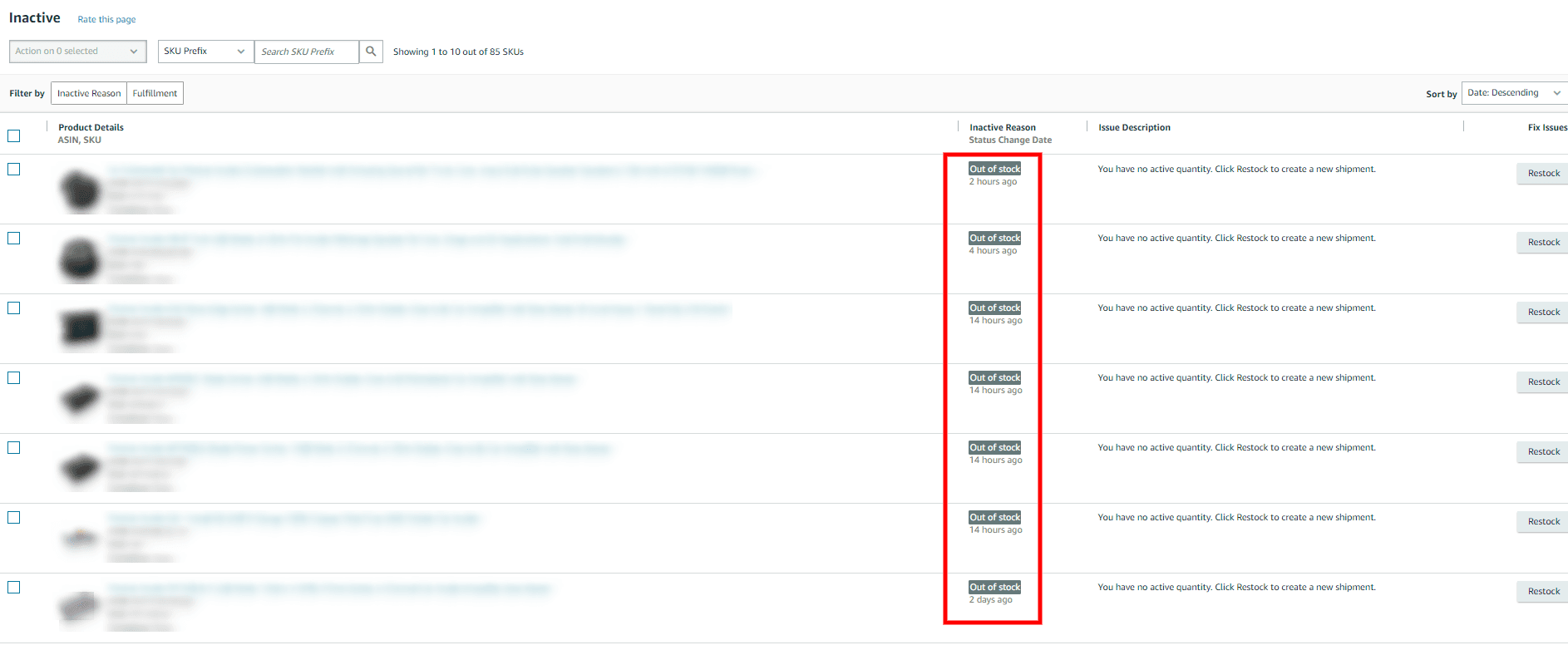
2: Check Buyer-Seller Messages
When you get to work, the first thing you do is check your emails and the first thing you do after opening your Seller Central backend is checking the buyer messages. The buyer-seller message service is a way where buyer and seller can communicate directly with each other.
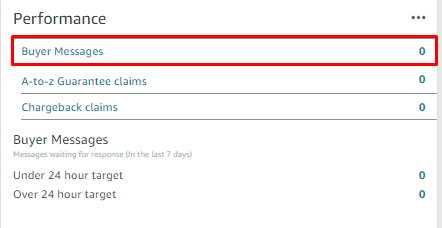
If you have any notification there, you should reply immediately. Replying as quickly as possible not only plays a vital role in increasing customer satisfaction but also affects your Amazon metrics. You have a maximum of 24 hours to respond to buyer messages. If you take any longer, you will get a late response mark. Sellers are allowed to reply late on 10% of their messages and if they go above that, it might create a risk of account suspension.
3: Check Product Reviews and Seller Feedback
Reviews are social proof that affects a customer’s buying decision even more than listing copy and images. When a seller has no control over what type of reviews they will receive, all they can do is thanking customers for buying their product and taking time to provide feedback. While responding to positive reviews, try to keep it as personalized as possible, this will build an emotional connection with them and they will feel valued.

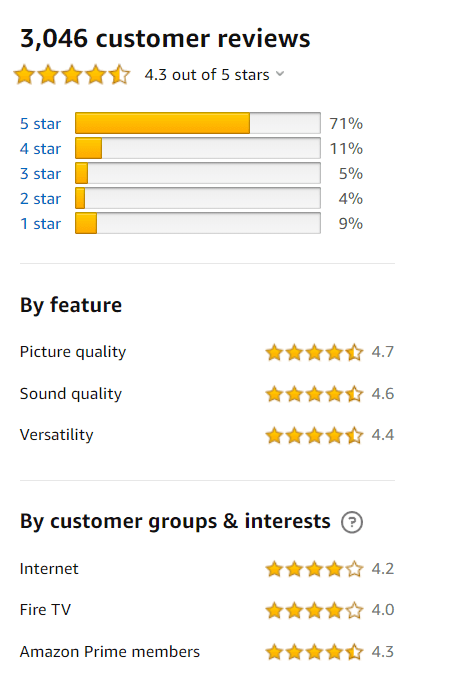
Of course, there are always negative reviews – seller’s worst nightmare.
Yes, bad reviews hurt and sometimes they can be downright cruel. But not replying to negative reviews or getting defensive might not be a wise decision. Take responsibility for the situation and respond in an empathetic and understanding way so that customer feels heard.
Want to know the safe and effective strategies to get reviews on your Amazon listing? Read our blog to know more:
4: Look for Any Suppressed Listing and Stranded Inventory
Amazon can suppress your listing if there are any quality issues or product is not compliant with Amazon standards. When your listing is suppressed, it will not show up in the search results on Amazon, even if it appears in the Manage Inventory. The worst part is that it’s not easy to detect a suppressed product, your listing can be suppressed and you might not even know about it for months.
Amazon does not notify you for suppressed listing, so the only option you are left with is to check manually. If you have an unexpected dip in sales, check for suppressed listing. Even if your sales are normal, you should have a habit of checking it every day to make sure your Amazon business is running smoothly.

Common reasons for suppressed Amazon listing:
Too long title
Use of words that are too promotional such as best, cheap or top rated
Image missing in the listing
Images not compliant with Amazon standards
Lack of any key information like UPC, bullet points, description or brand information
How to fix suppressed listing?
Open Manage Inventory and select Suppressed on the top navigation pane (if you do not have any suppressed listing you won’t see this option)
Select viewing option. Whether you want to view all suppressed listing or a specific type of suppressed listing such as missing product image
On the Edit Details page, select the tab which has an alert indicator, suppressed listings are indicated by a red exclamation mark and quality alerts are indicated by a yellow triangle.
Resolve the issue and click on save and finish
Stranded Inventory refers to the inventory in the FBA warehouse that does not have an active offer on Amazon. Your listing will just sit there, costing you money until you fix the reason as to why it was stranded. Stranded inventory is also used to calculate inventory performance index (IPI) and if your IPI falls below a certain threshold, Amazon will limit your storage space.
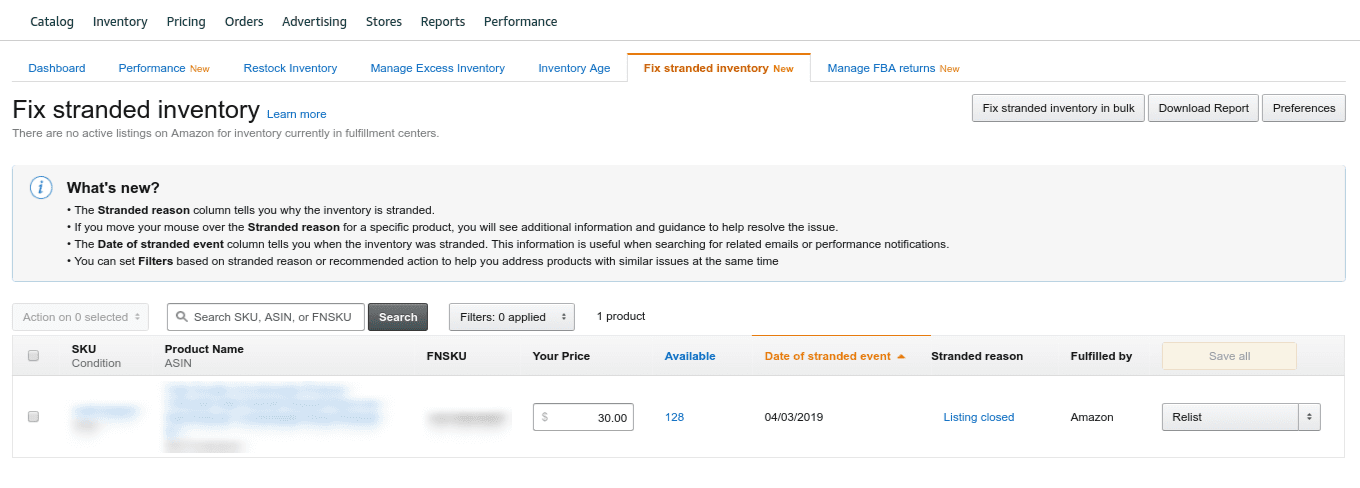
Common reasons for stranded inventory:
Item requires brand or item approval before selling
Any listing error
Use of restricted ASINs
How to fix stranded inventory?
Go to Manage Inventory
In the list of links on the top of the page, you will find “Inventory Dashboard”
Click on “Fix Stranded Inventory”
Resolve the issue
5: Sponsored Ad Management
Sponsored product ads are a great way to get traffic on your product listing and can also give your product a boost in organic ranking. The most important metric in these ads is ACoS and spend threshold. Decide on how much dollars you are willing to spend every month. Once you are done, you can start making campaigns. But the work does not end here, Amazon PPC campaign requires everyday attention and micro-level management. If you not alert, then it may lead to a lot of unprofitable clicks and spend. Sellers should check each and every campaign daily, scale the bids and add new keywords.
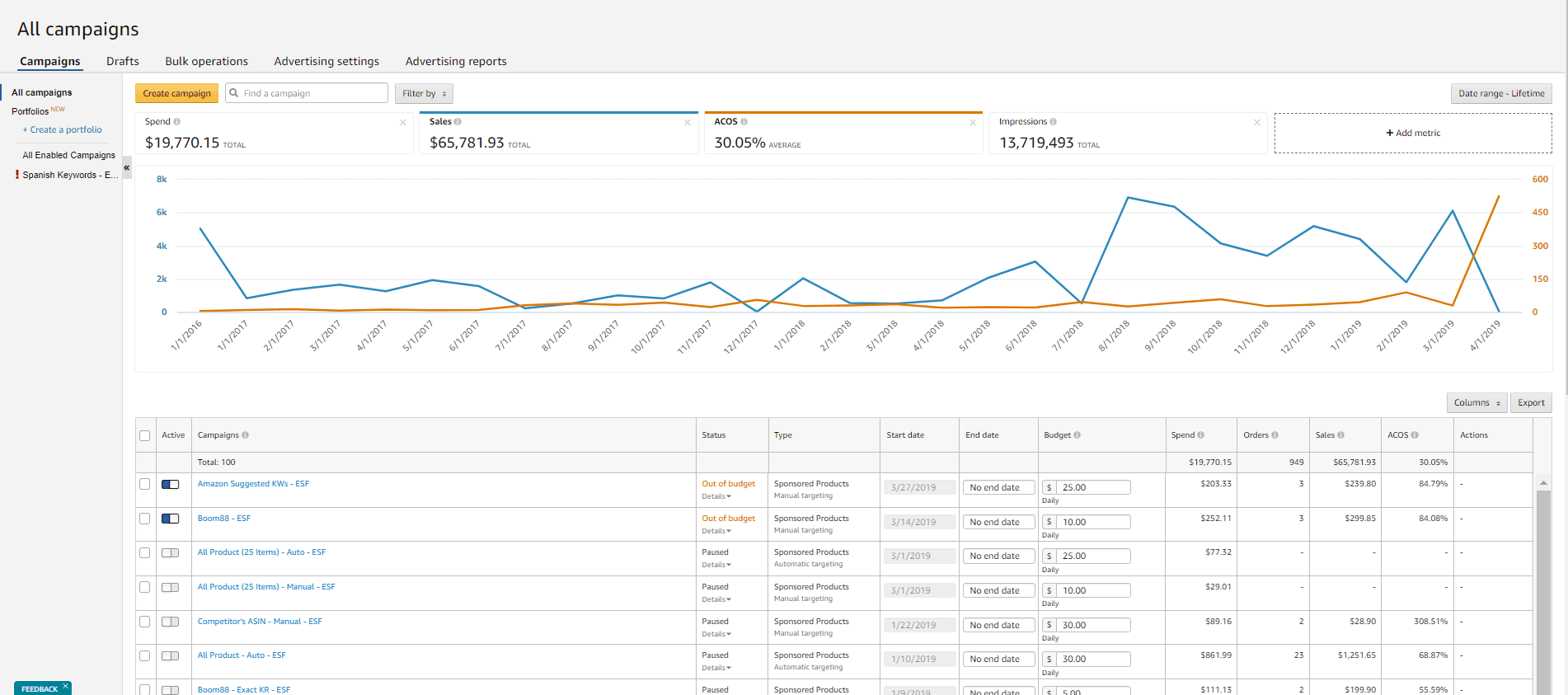
6: Check Performance Notifications
Performance notifications allow the seller to view any notification regarding the seller’s account that Amazon has sent out. Ignoring performance notification can lead to your account being suspended. You can get a performance notification if:
Your product is priced higher than other retailers
Your listing has a high rate of negative customer experiences
Your description does not match with your product
Your detail page has been removed because any of the Amazon guidelines and policies are not followed
Your listing is suppressed
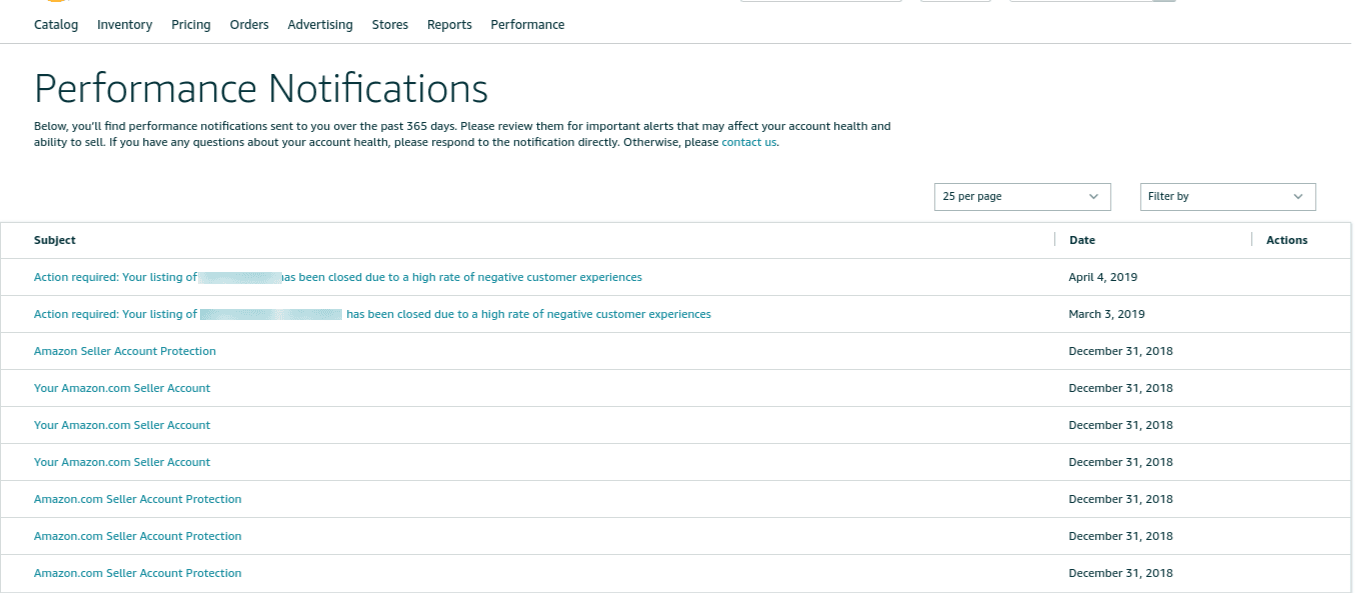
In the performance notification page, you will find all the customer notifications that Amazon has sent you over the past 365 days. The seller should check performance notifications daily and immediately resolve them.
Bonus Tip: Choose FBA as your fulfillment system
With FBA, sellers won’t have to deal with the hassle of packing, picking, and shipping. They can just send their inventory to FBA fulfillment center and let Amazon with their robust infrastructure, handle the rest.
That’s all folks. If you do all of the above-mentioned things daily, your account health will always be up to the mark. We know what you are thinking, “Now that’s a lot of work, and if I do all these when will I focus on other aspects of my business?” Don’t worry; work smarter and outsource these tasks to expert Amazon consultants from eStore Factory. We will manage your seller central backend as well as deal with the day to day account issues so you can get other important stuff done.
A day in the life of an Amazon seller is not a piece of cake. Managing your Amazon account requires a lot of time, constant attention and hardcore knowledge of how things work. You will have to dedicate a chunk of your day to make sure things are running well. If you leave your account unattended for a few days, it might deteriorate your account health, you can lose your hard earned money on unprofitable spends or worse - your account can get suspended. With the experience of managing more than 500 seller accounts, we have listed out six little yet important things every seller should do daily.
1: Check Your Stocks
Optimum inventory management is essential to keep the sales flowing. Sellers should check their inventory daily, if not daily at least check them once or twice a week. They should be aware of how much inventory they have and what the inventory requirement is. If someday you sell more than expected, you should coordinate with the supplier to get stock sooner than scheduled.
Remember one thing: No inventory = NO sales and LOW product ranking
The last thing you want is an out of stock message on your Amazon listing. It frustrates buyer the most and losing that business will cost you more than dollars. Being out of stock for a long time affects your organic ranking as your listing won’t show up in the search results. Moreover, sellers selling in a competitive category will have a hard time fighting their way back once they are restocked.

2: Check Buyer-Seller Messages
When you get to work, the first thing you do is check your emails and the first thing you do after opening your Seller Central backend is checking the buyer messages. The buyer-seller message service is a way where buyer and seller can communicate directly with each other.

If you have any notification there, you should reply immediately. Replying as quickly as possible not only plays a vital role in increasing customer satisfaction but also affects your Amazon metrics. You have a maximum of 24 hours to respond to buyer messages. If you take any longer, you will get a late response mark. Sellers are allowed to reply late on 10% of their messages and if they go above that, it might create a risk of account suspension.
3: Check Product Reviews and Seller Feedback
Reviews are social proof that affects a customer’s buying decision even more than listing copy and images. When a seller has no control over what type of reviews they will receive, all they can do is thanking customers for buying their product and taking time to provide feedback. While responding to positive reviews, try to keep it as personalized as possible, this will build an emotional connection with them and they will feel valued.


Of course, there are always negative reviews – seller’s worst nightmare.
Yes, bad reviews hurt and sometimes they can be downright cruel. But not replying to negative reviews or getting defensive might not be a wise decision. Take responsibility for the situation and respond in an empathetic and understanding way so that customer feels heard.
Want to know the safe and effective strategies to get reviews on your Amazon listing? Read our blog to know more:
4: Look for Any Suppressed Listing and Stranded Inventory
Amazon can suppress your listing if there are any quality issues or product is not compliant with Amazon standards. When your listing is suppressed, it will not show up in the search results on Amazon, even if it appears in the Manage Inventory. The worst part is that it’s not easy to detect a suppressed product, your listing can be suppressed and you might not even know about it for months.
Amazon does not notify you for suppressed listing, so the only option you are left with is to check manually. If you have an unexpected dip in sales, check for suppressed listing. Even if your sales are normal, you should have a habit of checking it every day to make sure your Amazon business is running smoothly.

Common reasons for suppressed Amazon listing:
Too long title
Use of words that are too promotional such as best, cheap or top rated
Image missing in the listing
Images not compliant with Amazon standards
Lack of any key information like UPC, bullet points, description or brand information
How to fix suppressed listing?
Open Manage Inventory and select Suppressed on the top navigation pane (if you do not have any suppressed listing you won’t see this option)
Select viewing option. Whether you want to view all suppressed listing or a specific type of suppressed listing such as missing product image
On the Edit Details page, select the tab which has an alert indicator, suppressed listings are indicated by a red exclamation mark and quality alerts are indicated by a yellow triangle.
Resolve the issue and click on save and finish
Stranded Inventory refers to the inventory in the FBA warehouse that does not have an active offer on Amazon. Your listing will just sit there, costing you money until you fix the reason as to why it was stranded. Stranded inventory is also used to calculate inventory performance index (IPI) and if your IPI falls below a certain threshold, Amazon will limit your storage space.

Common reasons for stranded inventory:
Item requires brand or item approval before selling
Any listing error
Use of restricted ASINs
How to fix stranded inventory?
Go to Manage Inventory
In the list of links on the top of the page, you will find “Inventory Dashboard”
Click on “Fix Stranded Inventory”
Resolve the issue
5: Sponsored Ad Management
Sponsored product ads are a great way to get traffic on your product listing and can also give your product a boost in organic ranking. The most important metric in these ads is ACoS and spend threshold. Decide on how much dollars you are willing to spend every month. Once you are done, you can start making campaigns. But the work does not end here, Amazon PPC campaign requires everyday attention and micro-level management. If you not alert, then it may lead to a lot of unprofitable clicks and spend. Sellers should check each and every campaign daily, scale the bids and add new keywords.

6: Check Performance Notifications
Performance notifications allow the seller to view any notification regarding the seller’s account that Amazon has sent out. Ignoring performance notification can lead to your account being suspended. You can get a performance notification if:
Your product is priced higher than other retailers
Your listing has a high rate of negative customer experiences
Your description does not match with your product
Your detail page has been removed because any of the Amazon guidelines and policies are not followed
Your listing is suppressed

In the performance notification page, you will find all the customer notifications that Amazon has sent you over the past 365 days. The seller should check performance notifications daily and immediately resolve them.
Bonus Tip: Choose FBA as your fulfillment system
With FBA, sellers won’t have to deal with the hassle of packing, picking, and shipping. They can just send their inventory to FBA fulfillment center and let Amazon with their robust infrastructure, handle the rest.
That’s all folks. If you do all of the above-mentioned things daily, your account health will always be up to the mark. We know what you are thinking, “Now that’s a lot of work, and if I do all these when will I focus on other aspects of my business?” Don’t worry; work smarter and outsource these tasks to expert Amazon consultants from eStore Factory. We will manage your seller central backend as well as deal with the day to day account issues so you can get other important stuff done.
A day in the life of an Amazon seller is not a piece of cake. Managing your Amazon account requires a lot of time, constant attention and hardcore knowledge of how things work. You will have to dedicate a chunk of your day to make sure things are running well. If you leave your account unattended for a few days, it might deteriorate your account health, you can lose your hard earned money on unprofitable spends or worse - your account can get suspended. With the experience of managing more than 500 seller accounts, we have listed out six little yet important things every seller should do daily.
1: Check Your Stocks
Optimum inventory management is essential to keep the sales flowing. Sellers should check their inventory daily, if not daily at least check them once or twice a week. They should be aware of how much inventory they have and what the inventory requirement is. If someday you sell more than expected, you should coordinate with the supplier to get stock sooner than scheduled.
Remember one thing: No inventory = NO sales and LOW product ranking
The last thing you want is an out of stock message on your Amazon listing. It frustrates buyer the most and losing that business will cost you more than dollars. Being out of stock for a long time affects your organic ranking as your listing won’t show up in the search results. Moreover, sellers selling in a competitive category will have a hard time fighting their way back once they are restocked.

2: Check Buyer-Seller Messages
When you get to work, the first thing you do is check your emails and the first thing you do after opening your Seller Central backend is checking the buyer messages. The buyer-seller message service is a way where buyer and seller can communicate directly with each other.

If you have any notification there, you should reply immediately. Replying as quickly as possible not only plays a vital role in increasing customer satisfaction but also affects your Amazon metrics. You have a maximum of 24 hours to respond to buyer messages. If you take any longer, you will get a late response mark. Sellers are allowed to reply late on 10% of their messages and if they go above that, it might create a risk of account suspension.
3: Check Product Reviews and Seller Feedback
Reviews are social proof that affects a customer’s buying decision even more than listing copy and images. When a seller has no control over what type of reviews they will receive, all they can do is thanking customers for buying their product and taking time to provide feedback. While responding to positive reviews, try to keep it as personalized as possible, this will build an emotional connection with them and they will feel valued.


Of course, there are always negative reviews – seller’s worst nightmare.
Yes, bad reviews hurt and sometimes they can be downright cruel. But not replying to negative reviews or getting defensive might not be a wise decision. Take responsibility for the situation and respond in an empathetic and understanding way so that customer feels heard.
Want to know the safe and effective strategies to get reviews on your Amazon listing? Read our blog to know more:
4: Look for Any Suppressed Listing and Stranded Inventory
Amazon can suppress your listing if there are any quality issues or product is not compliant with Amazon standards. When your listing is suppressed, it will not show up in the search results on Amazon, even if it appears in the Manage Inventory. The worst part is that it’s not easy to detect a suppressed product, your listing can be suppressed and you might not even know about it for months.
Amazon does not notify you for suppressed listing, so the only option you are left with is to check manually. If you have an unexpected dip in sales, check for suppressed listing. Even if your sales are normal, you should have a habit of checking it every day to make sure your Amazon business is running smoothly.

Common reasons for suppressed Amazon listing:
Too long title
Use of words that are too promotional such as best, cheap or top rated
Image missing in the listing
Images not compliant with Amazon standards
Lack of any key information like UPC, bullet points, description or brand information
How to fix suppressed listing?
Open Manage Inventory and select Suppressed on the top navigation pane (if you do not have any suppressed listing you won’t see this option)
Select viewing option. Whether you want to view all suppressed listing or a specific type of suppressed listing such as missing product image
On the Edit Details page, select the tab which has an alert indicator, suppressed listings are indicated by a red exclamation mark and quality alerts are indicated by a yellow triangle.
Resolve the issue and click on save and finish
Stranded Inventory refers to the inventory in the FBA warehouse that does not have an active offer on Amazon. Your listing will just sit there, costing you money until you fix the reason as to why it was stranded. Stranded inventory is also used to calculate inventory performance index (IPI) and if your IPI falls below a certain threshold, Amazon will limit your storage space.

Common reasons for stranded inventory:
Item requires brand or item approval before selling
Any listing error
Use of restricted ASINs
How to fix stranded inventory?
Go to Manage Inventory
In the list of links on the top of the page, you will find “Inventory Dashboard”
Click on “Fix Stranded Inventory”
Resolve the issue
5: Sponsored Ad Management
Sponsored product ads are a great way to get traffic on your product listing and can also give your product a boost in organic ranking. The most important metric in these ads is ACoS and spend threshold. Decide on how much dollars you are willing to spend every month. Once you are done, you can start making campaigns. But the work does not end here, Amazon PPC campaign requires everyday attention and micro-level management. If you not alert, then it may lead to a lot of unprofitable clicks and spend. Sellers should check each and every campaign daily, scale the bids and add new keywords.

6: Check Performance Notifications
Performance notifications allow the seller to view any notification regarding the seller’s account that Amazon has sent out. Ignoring performance notification can lead to your account being suspended. You can get a performance notification if:
Your product is priced higher than other retailers
Your listing has a high rate of negative customer experiences
Your description does not match with your product
Your detail page has been removed because any of the Amazon guidelines and policies are not followed
Your listing is suppressed

In the performance notification page, you will find all the customer notifications that Amazon has sent you over the past 365 days. The seller should check performance notifications daily and immediately resolve them.
Bonus Tip: Choose FBA as your fulfillment system
With FBA, sellers won’t have to deal with the hassle of packing, picking, and shipping. They can just send their inventory to FBA fulfillment center and let Amazon with their robust infrastructure, handle the rest.
That’s all folks. If you do all of the above-mentioned things daily, your account health will always be up to the mark. We know what you are thinking, “Now that’s a lot of work, and if I do all these when will I focus on other aspects of my business?” Don’t worry; work smarter and outsource these tasks to expert Amazon consultants from eStore Factory. We will manage your seller central backend as well as deal with the day to day account issues so you can get other important stuff done.










